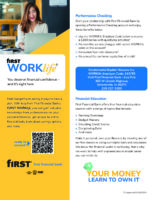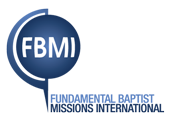FBMI Updates
Friday Financial Tip #41: Debit Cards
Be sure to use your debit card regularly so it doesn’t become inactive or dormant. If you and your spouse each have a debit card, you should ensure that both cards are activated. You should also use each card regularly, if possible. Using both cards at least once a month will ensure consistency and help prepare you for emergencies (“I accidentally threw away my debit card!”). As always, you can contact your FSC with any questions. You can also contact First Financial Bank with any specific questions about your banking details or needs. For general information and help, as well as local branch contact information, visit bankatfirst.com. For account related issues or online banking assistance, please call tel:+18773229530.
Friday Financial Tip #40: Copyrighted Photos
“Be sober, be vigilant; because your adversary the devil, as a roaring lion, walketh about, seeking whom he may devour.” (I Peter 5:8)
When posting pictures from the internet, be sure that the photo is not copyrighted.
FBMI was recently contacted by a lawyer’s office, claiming that we had used a copyrighted photo on our website without permission. A stock photo had been used for a missionary’s prayer letter and then posted on the FBMI website. When our office asked for legal advice about this situation, we were advised that we may need to pay the damages demanded. After looking into the details, we discovered that the missionary had indeed purchased the license to use the picture and had followed the agreement as stipulated by the copyright owner.
This situation is a good opportunity to be reminded of the necessity of ensuring that you buy the proper licensing and permissions whenever you use any media obtained online. If you want to use a publicly available photograph or other media, ensure that this media is legally able to be used in the desired way. Do not use any photo that you do not have permission to use for your prayer letter or other updates.
Friday Financial Tip #39: Spotting a Scam in Any Form
Whether it’s an AI deep-fake video, a phishing email, or a messenger on horseback with a sealed letter, scammers throughout history share these universal red flags:
• Urgency: Creating artificial time pressure to force hasty decisions without proper consideration
• Fear and Intimidation: Using threats of consequences, financial penalties, or legal action
• Unsolicited Contact: Initiating the interaction, often claiming to represent trusted organizations
• Too Good to Be True: Offering implausible rewards, unrealistic investment returns, or unlikely windfalls
• Personal-Information Requests: Fishing for details that legitimate entities wouldn’t ask for in that manner
The technology may change from quill and parchment to sophisticated algorithms, but a scammer’s psychological tactics remain remarkably consistent throughout the ages.
Friday Financial Tip #38: Field Service Coordinators
Your Field Service Coordinator is here to help!
Our Field Services Team is eager to help missionaries with any questions. Under the leadership of Dr. Siemer, our Field Services Director, the Field Service Coordinators (FSCs) serve missionaries in different parts of the world. Missionaries in Europe and Africa are served by Jeremy Snipes, Jim Belisle serves missionaries in the Americas, and Joe Palmer serves missionaries in Asia and Oceania. Each member of our FSC team has many years of ministry experience, as well as a heart for each missionary and valuable knowledge and resources to encourage, inform, and solve problems.
When you have questions for the FBMI office, the first step is always your FSC. Often, the FSC will have the answer directly. Other times he will provide context and work to get your question answered by someone else. Your FSC is eager to help with questions about paperwork, support, and even EOMs.
Please feel free to reach out (to your FSC) if you have any questions. 😊 Thank you so much for loving Jesus and serving Him faithfully.
Friday Financial Tip #37: Identity Theft Protection
The following resource video, produced by First Financial Bank, is meant to help you be aware of and avoid many of the most common deceitful practices in attempted identity theft.
“Your identity is your most important asset, and protecting it should be your highest priority. Our free class teaches you how to spot the signs of identity theft, how to protect yourself, and what to do if you think your identity has been compromised. Stop scammers in their tracks with skills you’ll use for a lifetime.”
Friday Financial Tip #36: First Financial Bank’s WORKlife Program
 Leadership from the First Financial Bank visited the FBMI office recently to ask how they could better serve our missionaries. In addition to looking for ways to excel at customer service and work to provide education and security, they also wanted you to know about their “WORKlife” program and the benefits that may be available to you.
Leadership from the First Financial Bank visited the FBMI office recently to ask how they could better serve our missionaries. In addition to looking for ways to excel at customer service and work to provide education and security, they also wanted you to know about their “WORKlife” program and the benefits that may be available to you.
Please refer to the provided PDF for more information about this program. This PDF includes a QR code, as well as other important information about “WORKlife.”
Thank you!
Friday Financial Tip #35: Don’t Assume!
Don’t Assume!
“Ninety-nine percent of problems in the ministry are communication problems.” Without proper communication, assumptions thrive. Making an assumption may be easier than asking a question, but many assumptions are wrong and lead to wrong conclusions about facts and feelings. With missionaries and finances, or any other matter, it is so important to communicate clearly to avoid the problems that come from assumptions. “Elevate communication, and eliminate imagination.”
Friday Financial Tip #34: Receiving Money from Third-Party Money Apps
What Happens When I Get Money Directly into My FBMI Account?
Recently, I have had discussions with a couple of missionaries in regards to getting money from third-party money apps directly into their FBMI work-fund accounts. In both cases, I had to remind the missionaries that monies received in this manner are not considered donations to FBMI. The donors of these funds cannot receive a charitable contribution statement from FBMI because the funds were not given to FBMI, a 501C3 non-profit organization. The funds were given directly to them as individuals.
Last year, First Financial Bank made access to Zelle very easy. I initiated the app myself. However, I soon came to realize how easy it would be to think getting money in this manner would constitute a donation to FBMI. That is not the case.
Also, remember that any ministry funds you receive that do not go through the FBMI office can generally be considered Support & Love Offerings Given Directly to You and should be entered into Box C on the EOM.
Missionary Evangelist James Belisle
FBMI Field Service Coordinator
Western Hemisphere
Friday Financial Tip #33: Printing of Prayer Letters
We are so glad to be able to serve Him with you. We are glad to be able to offer many services related to prayer letters and other updates through our FBMI office. Most of you are very familiar with our free emailing service, which includes proofreading, posting, and sending each update to all of your subscribers. This service is a great way to send your update to hundreds or thousands of subscribers at no cost to you.
In addition, many of you use our Prayer Letter Services, which is a paid service allowing you to send physical, mailed prayer letters. This service is provided through a partnership with FBMI and Grace to Grow Publications. Because of rising overhead and equipment costs, the charges from Grace to Grow are increasing by 20%. For a black-and-white, one-page letter printed on existing full-color letterhead and envelope, the updated cost for printing, folding, inserting, sealing, and mailing one letter is $1.41. This price includes the 73-cent stamp as well.
This price increase will take effect on March 1. If you have any questions or would like more details, please feel free to reach out to us.
Thank you for your time and for your faithful service. Have a great day in our Lord Jesus Christ!
Friday Financial Tip #32: Life Insurance
FBMI strongly encourages all of our missionaries to have adequate life insurance.
Many of today’s financial advisors would tell you that you should have enough life insurance to pay ten years’ worth of expenses. Note that this is not the same as ten years’ worth of income.


